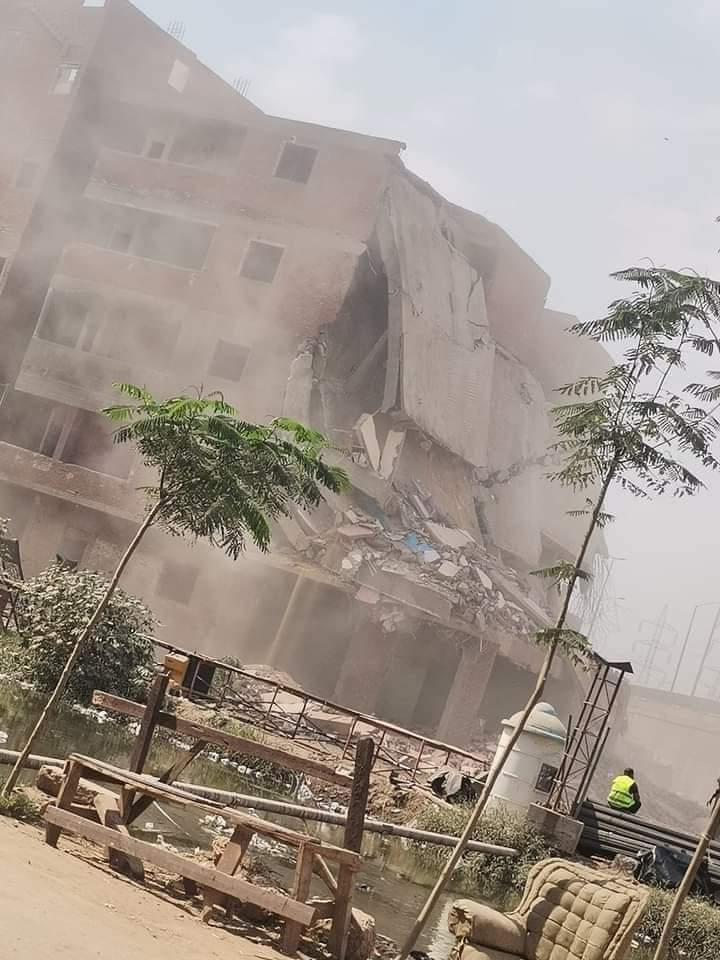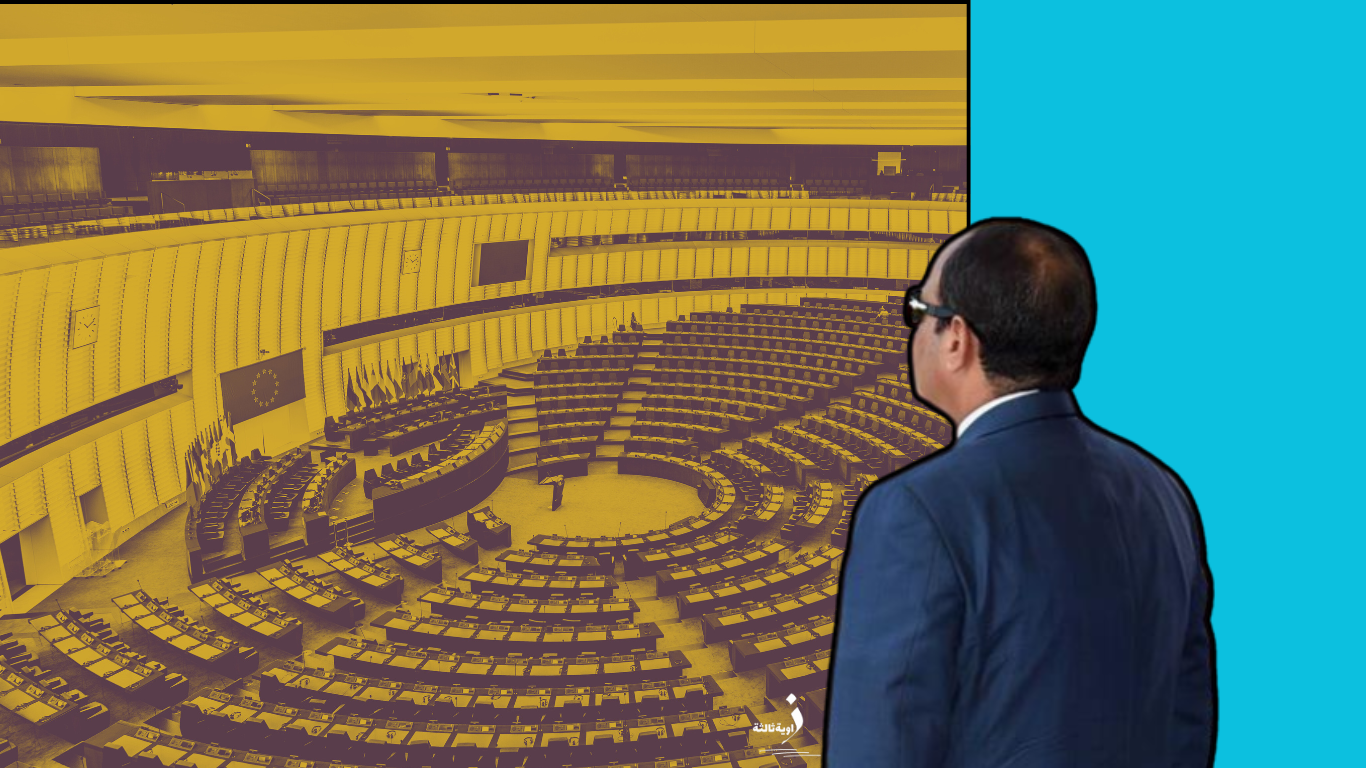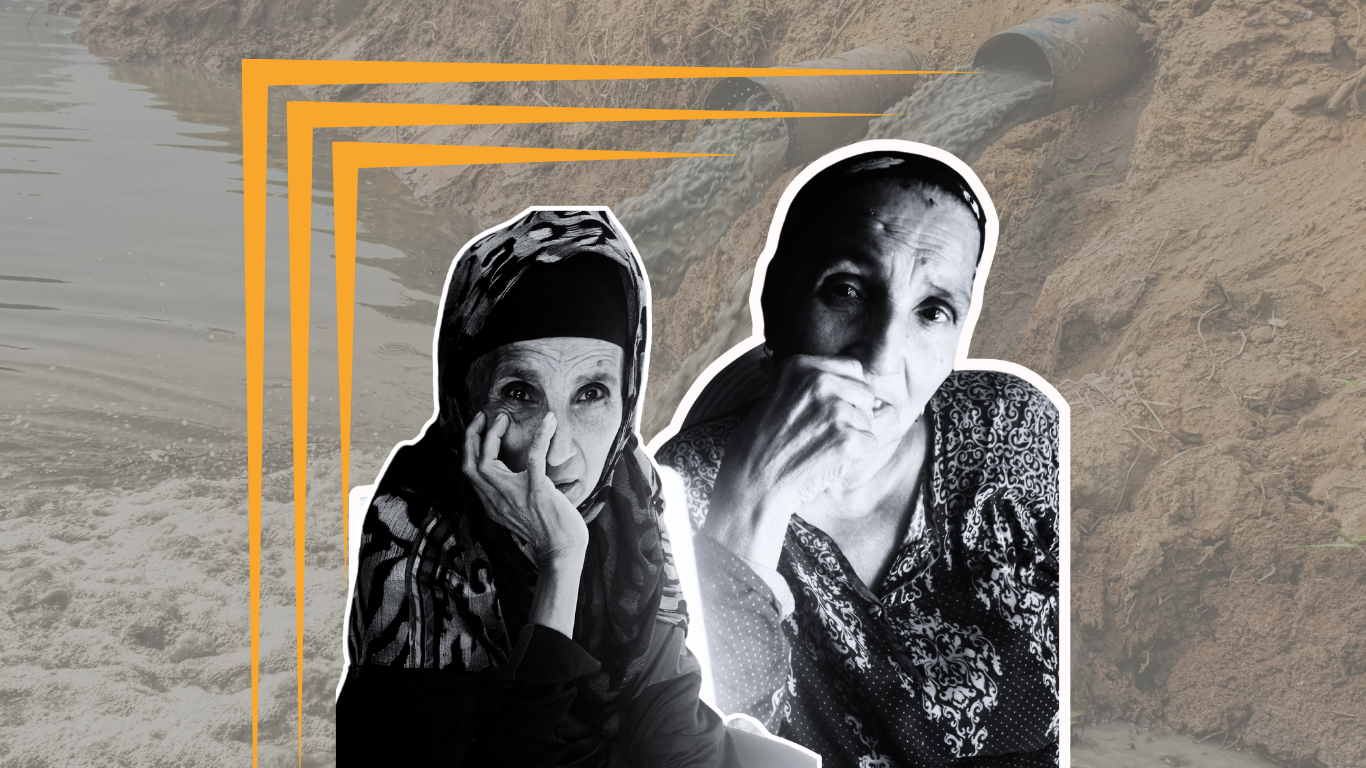Renting out apartments was a lifeline for me amid difficult living conditions. I felt like the world had ended when my house was demolished before my eyes because I used the rental income for food, drink, and my children’s education,” said Amna Abdel Hadi, her heart squeezing with regret over the loss of her property, without receiving compensation for the land or buildings as promised by representatives of the Roads and Bridges Authority who carried out the demolition decision.
Amna, a 53-year-old woman, narrates her story with the property, spanning back 15 years when she acquired it while the building was only two floors. She expanded it to six floors to secure a future for her five children, ranging in age from six to 23. The rental income from the property’s apartments helped her meet her children’s needs amidst tough and mysterious circumstances overshadowing her elderly husband.
In this report, we shed light on the Egyptian government’s violation of Article 35 of the Egyptian Constitution of 2014, which asserts that “private property is inviolable and may not be encroached upon except for the public good and with fair compensation.” These violations also contradict the provisions of the Expropriation Law No. 10 of 1990 and its amendments issued in 2018 and 2020, which stipulate that compensation must be equivalent to the market value of the property at the time the expropriation decision is made, and that compensation must be disbursed within three months from the date of the decision.
|
In September 2020, Egyptian President Abdel Fattah el-Sisi issued a presidential decree approving amendments to the law concerning expropriation for public benefit. The amendments included provisions for compensation equivalent to prevailing market prices plus an additional 20%, and mandated the formation of a committee in each governorate by decision of the Minister of Irrigation to determine compensation values. |
The woman lives in Minya, one of the southern provinces of Egypt, but she has always made it a habit to go to Cairo just to collect rent. After her house was demolished, she no longer sets foot towards the capital. Despite finding relief from the noise of bustling Cairo, she struggles with life’s challenges due to not receiving compensation yet. She believes the delay is caused by the Survey Authority in Giza Governorate not processing it, stating that officials took her necessary documents but to no avail.
“As long as I breathe, I will continue to seek my rights and will not give up. My motivation stems from the feeling of losing my dream and indescribable emotions when I saw my house vanish into thin air,” Amna continues her conversation with ‘Zawia3’, pointing out that the scene of her demolished 150-square-meter house still replays in her mind daily and even in her dreams. She vividly remembers all the details conveyed to her and the other occupants of the house, informing them of a mere 30-day deadline to evacuate.
Amna mentioned not taking any legal action to pursue her promised compensation for the land and buildings, emphasizing her deep fear of this step, fearing any potential reprisal, as she describes it.
Real estate prices have been experiencing volatile increases on a monthly basis since the beginning of 2023. According to statements by MP Tarek Shoukry, Deputy Chairman of the Housing Committee in the House of Representatives and President of the Real Estate Development Chamber at the Egyptian Industries Federation, property prices have risen by an estimated 100% in some new projects. This increase is attributed to the country’s high inflation, rising construction costs, and increased demand for real estate amid fears of another depreciation in the local currency exchange rate.
|
Citizens in Egypt have been caught off guard by soaring core inflation rates, reaching over 38.1% in October 2023. According to recent data from the Central Bank of Egypt, inflation was also at approximately 29.8% in January of the past year. This has added to the concerns of citizens who have not received necessary compensations, whether to replace their expropriated homes or to cover expenses in their rented accommodations. |
The property “Amna” was not the first but is among 2,000 properties that the Egyptian government has been demolishing since the beginning of 2021 to widen the capacity of the Ring Road. This is in exchange for a social compensation estimated by the government at 40,000 Egyptian pounds per room. The demolition measures are part of efforts to expand the road network and build the electric train system, affecting various neighborhoods in Cairo, Giza, and Qalyubia.
Don’t miss: Eviction Chaos Hits Port Said, Egypt: “Beautiful Suburb” Residents Demand Justice
Development Turns into a Nightmare
With a sad voice and tears in his eyes, Abdel Rahman Hassan (28 years old) from Sohag Governorate, one of the southern provinces of Upper Egypt, speaks about his struggle to receive compensation for his demolished house located in the “Bashtil” area, one of the popular neighborhoods adjacent to the Ring Road, for public benefit. He says, “Initially, there was a meeting to carry out the demolition of my house in 2021, and at that time, they agreed with the tenants on compensating them – social compensation.”

Indeed, the tenants received compensation to vacate their residential apartments, with each tenant receiving 25,000 pounds per room, without accounting for the bathroom and kitchen units. Each tenant received approximately 60,000 pounds, equivalent to around $1,946 based on the dollar exchange rate in Egyptian banks, according to Abdel Rahman.
He adds, “I did not receive any compensation as the property owner for the land and buildings. After a full year since my house was demolished, I was visited by an official from the government’s Survey Authority responsible for assessing the areas demolished for compensation. They informed me that I would receive compensation within just three months, but this did not happen. A few days later, I was notified that I needed to provide a clearance from the Real Estate Tax Authority. I promptly obtained it, and based on that, I was promised to receive my funds, which were determined to be 1.4 million Egyptian pounds, equivalent to $45,426 according to official bank rates. However, I also did not receive it within the specified period as previously indicated by the officials, which ended on January 26th.”
Describing his property, Hassan says it was an eight-story building covering an area of 130 square meters. According to compensation calculations, the property owner was supposed to receive 200,000 pounds more than the price he paid for the property when he purchased it in 2017 for 1.2 million pounds, at a time when property prices in Egypt soared to unprecedented levels.
|
According to a recent report released by “Market Watch,” the average price of residential apartments in Egypt rose by 30% in the first quarter of 2023 compared to the first quarter of 2022. Meanwhile, the average asking price for villas jumped by 25%, and the average rent for apartments and villas saw an increase of around 24% compared to the same period last year. |
Despair crept into Hassan, prompting him to travel back to his hometown in Sohag, where he opened a supermarket there, seeking a solution to his crisis that had consumed his savings, as he describes. He only received compensation for three apartments and two shops that were registered in his name, while the remaining apartments were compensated directly to the tenants.
Hassan was affected by the plight of his neighbors who lost their homes and have yet to receive any compensation, with no alternative housing. He urged officials to provide compensation to property owners within the legally mandated period or to compensate them before demolition, providing an alternative refuge for those affected.
Don’t miss: Egypt: Ras Al-Hikma Residents Unite Against Forced City Sale
Defiant Government
Commenting on the situation, Deputy Ehab Mansour, head of the parliamentary body of the Social Democratic Party and vice-chair of the Labor Force Committee, says that the compensation file is excessively large, initiated by the state since the beginning of 2020, specifically in Giza Governorate, which is considered the second capital of Egypt after Cairo.
According to Article 35 of the Egyptian Constitution, as emphasized by the vice-chair of the Labor Force Committee in his conversation with “Zawia3,” the state has the right to expropriate the property of citizens located in areas intended for public benefit. However, the same article also stipulates the necessity of providing “fair monetary compensation paid in advance.” Yet, this compensation has not been paid in advance in Giza or other governorates.
The deputy of the Labor Force Committee in the House of Representatives accused Mustafa Madbouly’s government of clear and serious violations of the constitution. Despite expropriating citizens’ properties and evicting them from their homes, and despite the completion of the first phase of demolitions, which included approximately 2,200 homes according to Major General Hossam El-Din Mostafa, head of the General Authority for Roads and Bridges, the state has neither provided them with compensation in advance nor after the expropriation. He confirmed that many citizens whose properties were expropriated in the last three years have not received full compensation, and some have not received any compensation at all.
In compliance with constitutional provisions, Mansour submitted an interpellation according to the internal regulations of the House of Representatives, addressed to the Prime Minister, due to the delay in disbursing compensation for expropriation for public benefit projects that have been completed or are ongoing in Giza Governorate, with decisions issued three years ago. As a result, a committee will be formed under the supervision of the Minister of Justice to bring together all relevant parties to expedite this matter.
Mansour clarified that compensation is divided into three parts: “social compensation, compensation for buildings, and compensation for land,” noting that most tenants of the units have already received social compensation. However, the remaining citizens who own land and buildings have not yet received compensation, which is contrary to the law.
|
The amounts of social compensation have ranged between 100,000 Egyptian pounds and 160,000 Egyptian pounds, equivalent to approximately $3,244 to a maximum of around $5,191. |
Citizens whose properties were expropriated have been waiting daily throughout these years to receive social compensation, followed by immediate compensation for buildings and land, but this has not happened. As a result, most citizens who received social compensation have spent it on renting new units, according to the parliamentary committee representative.
The deputy, Mansour, attributed the crisis to the government’s claim that there are not enough funds to pay compensation from its treasury. This prompted him to contact the governorate of Giza, as well as the Ministry of Housing and Urban Communities, Ministry of Local Development, Ministry of Transportation, and the Prime Minister. They all responded that the compensation funds had already been transferred to the Giza Survey Authority, which was supposed to disburse them to citizens.
In a direct accusation, the deputy stated that the Giza Survey Authority had seized compensation funds and failed to disburse them to citizens, accusing them of clear violations of the constitution and obstructing citizens’ interests. He described the compensation amounts as inadequate for purchasing an apartment due to the exorbitant rise in property prices, deeming the compensation value unfair. He emphasized that the state must provide alternative housing for the affected individuals because the compensation amounts are insufficient to buy decent housing now that prices have doubled (for example, a housing unit previously sold for 500,000 Egyptian pounds now costs around 1 million pounds, equivalent to about $32,477).
Another accusation was directed at the Minister of Irrigation, confirming that he went to see him in his office as responsible for survey authorities in the governorates. He affirmed that the minister does not meet with deputies, is unaware of citizens’ problems, and does not pay attention to them. Consequently, he sent a letter requesting financial support for additional staff in the Giza Survey Authority to expedite compensation procedures for citizens. However, there has been no response so far, with expectations centered around the committee that the Minister of Justice will form to expedite procedures, according to the parliamentarian’s account.
Mansour demanded the immediate dismissal and departure of the government, accusing it of causing citizens’ suffering and loss of their rights. He questioned why the government has been stingy with citizens, describing the situation as a failure in implementation and a hindrance to citizens’ interests with delays in disbursing their entitlements.
Government-Induced Suffering
In the heart of Cairo, where the waves of life between the old and the new collide, stands Abd al-Rahman Mahmoud (27 years old), burdened with the suitcase of his painful memories, recounting his story of losing his home—a place that was not just walls and ceilings but a warm corner that held every detail and cherished memory.
Mahmoud speaks of the difficulties he faced during the eviction process and how his home, built with love and care in every corner, turned into scattered memories. He says with a tone filled with sorrow, “Initially, it was extremely challenging, especially when the idea of leaving my home that I built with my own hands turned into a painful reality.”
In the final farewell moments of the house, he describes his bitter feelings when he had to leave everything behind, “These little things, which may not mean much to others, were a part of our lives here.”
He narrates how the last days in the property turned into a series of painful events. “The man responsible for the eviction came at a time when I was confused and tense, and I didn’t really know what was happening,” says Abd al-Rahman. “He removed the doors and windows of the apartments as if it were routine for him, but for me, those were very painful moments. The biggest surprise came when a friend visited the property and couldn’t find it because it was demolished without informing its residents.” According to Mahmoud, he had rented the apartment under the old rent system in 2019, but it was demolished along with the entire building in 2023. He then moved to an alternative apartment in the Heliopolis district.
|
This story is not just about losing a home; it is an expression of shock and loss that individuals can experience when the landmarks of their daily lives change drastically and unexpectedly. This incident highlights the urgent need for more humane and transparent procedures in eviction and urban redevelopment processes. |
Reflecting back, the weeks leading up to the demolition were described as exhausting and filled with tension. “They gave us only one week to vacate the apartment. It was a turbulent period, moving belongings, searching for a new place to stay, all of it was extremely difficult.” Adapting to my new apartment was incredibly challenging, and it took months to recover from the psychological effects,” says Mahmoud.
The financial compensation received by Abdul Rahman and his family, amounting to 40,000 Egyptian pounds per room, was deemed insufficient by him to cover the costs of an alternative apartment. “The compensation is not enough to buy a new apartment, especially with rising property prices,” explains Abdul Rahman, expressing dissatisfaction with the current situation.
Surgical Solution to Congestion Issues
Dr. Hassan Mahdi, Professor of Roads and Transportation at the Faculty of Engineering, Ain Shams University, described the Ring Road expansion project to “Zawia3” as crucial, labeling it as a bold and surgical solution to traffic congestion issues on the Ring Road. Traffic densities in certain sections of the Ring Road sometimes reach up to 130,000 vehicles per day, leading to numerous traffic jams throughout the day.
The Ring Road, which passes through more than three governorates, witnesses traffic volumes of up to 6.39 million vehicles monthly, according to estimates revealed by Major General Hossam El Din Moustafa, head of the General Authority for Roads and Bridges.
The roads professor at Ain Shams University affirmed that the state intervened to carry out the necessary expansion, increasing the number of lanes from seven to eight in each direction, making it a comprehensive and radical solution to the issues faced by the 104-kilometer-long Ring Road. Originally built in the 1980s with two lanes in each direction, the lack of law enforcement over the past decades resulted in encroachments by citizens onto the road’s territory, with adjacent buildings encroaching increasingly.
He continued in his interview with “Zawia3” that the state was compelled to intervene in the road’s development and expansion, necessitating the removal of many unregulated buildings and structures encroaching on the road’s territory. Consequently, the state decided to commit to compensating the owners of both licensed and unlicensed buildings, based on the number of rooms in each residential unit, emphasizing that affected individuals have the right to pursue legal avenues with the documents they possess.
|
Amid the continued implementation of development plans by the government and its agencies, residents of various areas, including those living in the Sixth and Seventh Districts of Nasr City in eastern Cairo, are anticipating the demolition of their homes and relocation to another place for the purpose of modernization and development. |
In a scene reflecting the plight of many citizens affected by government development projects, young Abdulrahman Hassan stands, having lost his sole source of livelihood after his house was demolished, waiting for compensation that he has yet to receive. Meanwhile, Umniyah, a resident of Minya and a mother of five, faces similar challenges awaiting the deserved compensation for her home, which was her primary source of income. At the same time, Abdulrahman Mahmoud laments having lost his apartment and its precious memories, embodying the human challenges faced by residents of neighborhoods impacted by urban development projects.













